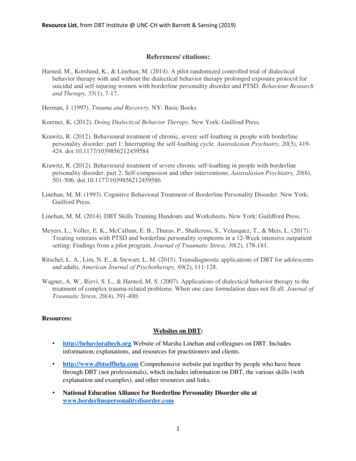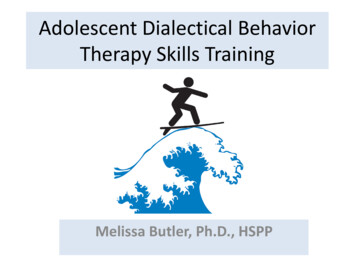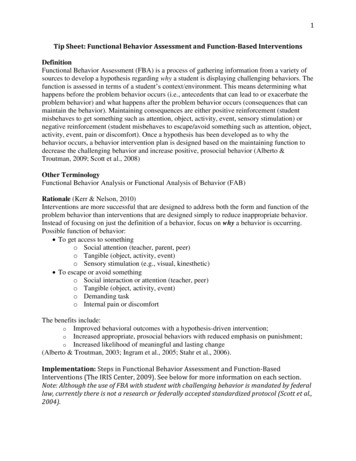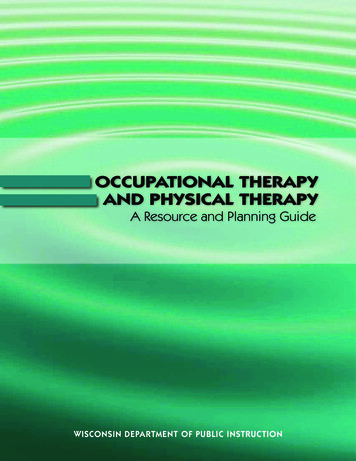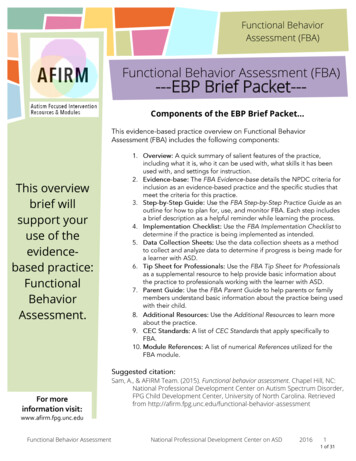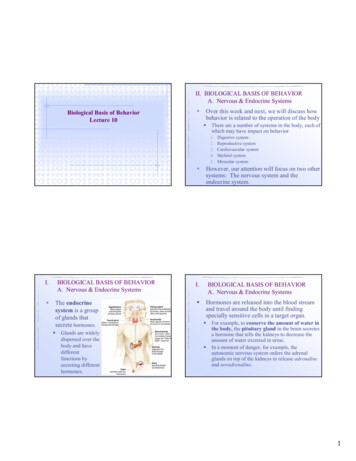
Transcription
Wednesday, 12:30 – 2:00, E4Adapted Dialectical Behavior TherapyKarma Mohring734-222-3580 mohringk@ewashtenaw.orgMichelle Shauger734-222-3500 shaugerm@ewashtenaw.orgMark Mitchell734-222-3522 mitchellm@ewashtenaw.orgKelly Shuler734-222-3453 shulerk@ewashtenaw.orgElaine Umholtz734-222-3588 umholtz@ewashtenaw.orgKatherine Potts734-222-3473 pottsk@ewashtenaw.orgEmily StrattonObjectives:1. Identify effective methods for the practical application of concepts related to improving thedelivery of services for persons with developmental disabilities2. Identify and emphasize attitudes that enhance the opportunities for persons with DD to achievetheir optimal potentialNotes:
4/13/2012Washtenaw County Community Support &Treatment ServicesAnn Arbor, MichiganKathleen “Karma” Mohring MA LPCMichelle Shauger MDKenneth Antkowiak MS LLPMark Mitchell LMSWElaine Umholtz LMSWKelly Shuler LMSWKatie Potts LMSWEmily Stratton BS Describe Identifycomponents of DBTfive functions of DBT Describeadaptations of DBT for individualswith intellectual disabilities Identifyconsumers with Intellectual Disability(ID) who may benefit from DBT Identifyoutcomes of consumers with ID whoparticipated in adapted DBT1
4/13/2012 DialecticalBehavior Therapyby Marsha Linehan, PhD (1993,Cognitive Behavioral Treatment ofBorderline Personality Disorder, New York:G ilf d PGuilfordPress)) Linehan added “Mindfulness” to CognitiveBehavioral Therapy principles. Combines therapeutic validation andacceptance of the person along withcognitive and behavioral change strategies PopularizedSynthesisThesis ------------------------------ Anti-Thesis Empiricallybased treatment for BorderlinePersonality Disorder Addressed problems related to emotional ,interpersonal, behavioral, cognitive and self- dysregulation Peoplep with ID who have a dual diagnosisghave been difficult to treat. DBT providestreatment across milieu such as residentialsettings, hospitals and family living situations Optimistic treatment for both consumers andtherapists Preserves the morale of the therapist2
4/13/2012 Addressesskills deficits in Mindfulness,Emotion Regulation, InterpersonalEffectiveness, and Distress Tolerance Morerecently expanded to treatment ofother populations (eating disorders,depression in the elderly, substance abuse,sex offenders) Studies in consumers with ID2004 (Dykstra & Charlton)2006 (Lew et al) 7-31%individuals in community w/ ID suffer apersonality disorder (2007, DM-ID, Fletcher) Delaysin development of personality maylead to frustration, acting-out behaviors Individualsw/ ID suffer abuse and neglect atrates 4-10 greater than the generalpopulation, further complicating personalitydevelopment1.Improve consumer skills2.Increase motivation for change3.Generalize skills to all relevantenvironments4.Structure theraputic environment topromote effectiveness5.Enhance therapist and staff skills3
4/13/2012 Patience DBTand consistency are key to DBTis skills based and it takes practice Acceptancedoes not mean agreement Therapists,like everyone, make mistakes DBTtherapists are consultants to theconsumer DBTtraining for therapists in theDevelopmental Disabilities (DD) department Weekly team consultation meetings began 8to 10 weeks prior to start Identification of consumers in DD dept whomay benefit from adapted DBT Mild levels of IDDiagnosis or traits of BPDProblems w/emotion regulation Originallyincluded some consumers withcognitive impairment from the MIdepartment AdaptedDykstra & Charlton’s “DBT forSpecial Populations” Orientation Prospective consumers, families, direct careppstaff,, other supports Weekly90-minute skills groups, covering all 4DBT modules (year commitment) Therapistsrotate as group leaders Weekly50-minute individual therapy sessions Naturalsupports and staff serve as coaches4
4/13/2012 10to 12 persons receiving therapy per groupfrom DD Services (current group of 14 whichinclude persons with FAS diagnosis) Teamof 5 DBT therapists, supervisor,psychiatrist and consultant Weekly team support meeting AdaptedCharlton and Dykstra’s handouts DiaryCard – Adapted and then evolved fromoriginal to current form Simplifiedmaterials adding symbols wherepossible Roleplays and interactive exercises Repetition/Review JeopardyJd of materialsGameGatt theth endd off eachh moduled lGraduation ceremony at end of year Furthertraining for family, direct-care staff,other supports who serve as coaches Additionof new group members at nextmodule Validation Validation is:A core DBT strategy to address the consequencesof biological dysfuntion interacting with aninvalidating systemFinding the kernel of truth or wisdom in theconsumer’s behaviorSeeing the world from the consumer’s point ofview, and saying sodoes not mean you have to:Agree with the consumerApprove of the behavior5
4/13/2012 Stayawake: Unbiased listening Accuratelyreflect back what was said Accuratelyreflect back what was not said FindFi dhowhththe bbehaviorh i makesk sense iin lilightht offthe individual’s history or biology Findhow the behavior makes sense in light ofnormal functioning and current context(Chain Analysis) Radicalgenuineness: be yourselfDialectical Behavior Therapy (DBT) AgreementAgreement with person receiving therapy:1)I agree to participate in weekly individual therapy sessions.2)I agree to practice skills at home and between groups.3)I agree to use the skills I am learning and not engage in selfharm or suicidal behavior.4)I agree to wait 24 hours before I contact my DBT individualtherapist should I engage in self-harm or suicidal behaviors.5)I agree to work on my therapy-interfering behaviors.6)I agree to participate in DBT group when the group starts and tofollow the group rules.My goals for DBT are:7)1)2)3)Signature . Date .Agreement Expiration Date .6
4/13/2012Therapist Agreement:1)I agree to make every effort to conduct competent and effectiveDBT therapy.2)I agree to work on my therapy interfering behaviors.3)I agree to follow professional and ethical guidelines.4)I agree to be available to you for individual therapy and briefphone coaching. In my absence, a DBT team member willprovide coaching.5)I agree to respect your rights and integrity.6)I agree to maintain your confidentiality.7)I agree to use available resources, including the DBT team, teamconsultation meetings, clinical supervision and training in orderto provide the best dialectical behavioral therapy.8)I agree to accept our humannness.9)I agree to monitor attendance. Repeated absences will bereviewed by the consultation team and discussed in individualsessions. Repeated absences can result in dismissal from DBT.Signature .Date . .Agreement Expiration Date .7
4/13/2012Interpersonal Effectiveness Homework 3How do you make choices in relationships?AskingLow Intensity (weak)1. Don’t ask, don’t hint.2. Hint to what you want. Example: “Hmm, that looks good”3. Ask softly.f y. EExample:mp “I wwould like it iff ”1. What is a weak way of asking for something that you want?Example: Asking a friend for a favor.High Intensity (strong)1. Ask strongly.Example: “Will you please ”1. What is a strong way of asking for something that you want?Example: Asking someone for help.Saying NoLow Intensity (weak)1. Just do what the other person wants.2. Say “I don’t want to” but do it anyway.1. What is a weak way of saying no?Example: “I don’t think I can but if you want me to ”High Intensity (strong)1. Say “NO” but think about it more.2. Just say “NO”.1. What is a strong way of saying no?Example: Standing your ground. “No means NO!”8
4/13/2012MindfulnessEmotionRegulation5 0300300300400400400400400400500500500500500500 Encourageattendance in pre-contemplativegroups (Life Enhancement Group andWellness Group) Orientation Case consultation Ongoing training of family, provider staff andagency staff Transition and introduction to GraduateGroup Graduate Group Utilizing Peer Leaders as co-facilitators9
4/13/201210
personality disorder (2007, DM-ID , Fletcher) Delays in development of personality may lead to frustration, acting-out behaviors Individuals w/ ID suffer abuse and neglect at rates 4-10 greater than the general population, further complicating personality development 1. Imp


